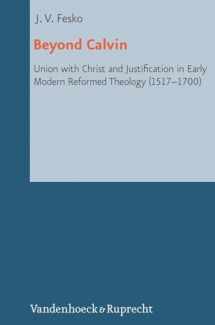
Beyond Calvin: Union With Christ and Justification in Early Modern Reformed Theology 1517-1700 (Reformed Historical Theology, 20)
Book details
Summary
Description
The investigation of union with Christ and justification has been dominated by the figure of John Calvin. Calvin's influence, however, has been exaggerated in our own day. Theologians within the Early Modern Reformed tradition contributed to the development of these doctrines and did not view Calvin as the normative theologian of the tradition. John V. Fesko, therefore, goes beyond Calvin and explores union with Christ and justification in the Reformation, Early Orthodox, and High Orthodox periods of the Reformed tradition and covers lesser known but equally important figures such as Juan de Valdes, Peter Martyr Vermigli, Girolamo Zanchi, William Perkins, John Owen, Francis Turretin, and Herman Witsius. The study also covers theologians that either lie outside or transgress the Reformed tradition, such as Martin Luther, Philip Melanchthon, Faustus Socinus, Jacob Arminius, and Richard Baxter. By treating this diverse body of figures the study reveals areas of agreement and diversity on these two doctrines. The author demonstrates that among the diverse formulations, all surveyed Reformed theologians accord justification priority over sanctification within the broader rubric of union with Christ. Fesko shows that Reformed theologians affirm both union with Christ and the golden chain of salvation, ideas that moderns find incompatible. In sum, rather than reading an individual theologian isolated from his context, this study provides a contextual reading of union with Christ and justification in the Early Modern Reformed context.


We would LOVE it if you could help us and other readers by reviewing the book
Book review



